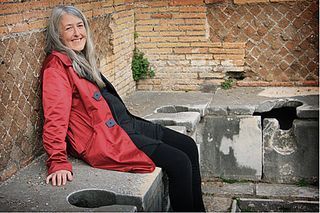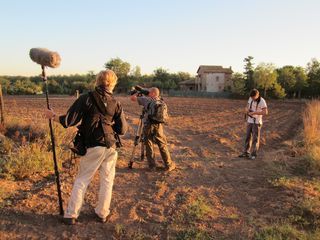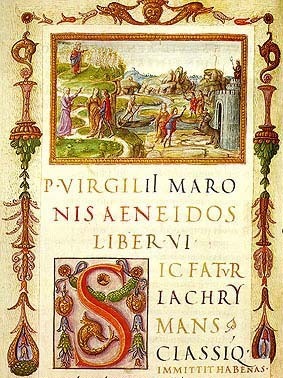Mary Beard's Blog, page 56
April 26, 2012
Meet the Romans, AA Gill and life's little ironies
Sorry that I have been a bit off radar these last few days, but I have been a bit swamped in Gill-gate. I've had my say on that, and dont need to go on about it any more. But as always there are some behind the scenes ironies, which I thought it would be fun to share.
First, the Dream School connection. I was sitting at home a couple of nights ago and the phone went. It was one of the kids from Dream School (who's now gone on to college)... he and another Dream Schooler had seen the Gill piece and wanted to check that I was OK. Think about it. On tv they sometimes looked like a bunch of tearaways.. but over a year later, they're still look out for their old Latin teacher!
Then, there was the point made to me by one of my colleagues who had taken part in Meet the Romans. I cant understand, he said, why they are saying you didnt brush your hair. I was there with you at Pompeii and the hairbrush was always coming out of the bag . . .
. . . it is I suppose, he went on, that if you are scrambling round archaeological sites, lying down in the dust of an ancient highrise, it is kind of hard (even inappropriate to look neat!)
And then there are the subtly different ways I've got support. I have been really overwhelmed with the response .. and I am pleased to have read such generous and cheering and heartwarming comments. Thank you all.
But they tend to come in one of two main forms. Either... what does it matter what she looks like? it's what she's showing us that counts. Or . . .I think she actually looks rather good anyway. In a way, I think both of those things. The programme is about content (and the stars are the Romans not M Beard). But when I look at some of the stills of the programme, I feel pretty happy about how I look. Grey, 57, but perfectly and naturally OK. Nothing special, but OK.
(And I was by the way secretly rather pleased when the Cambridge News illustrated their article on the controversy with a really awful pic of AA Gill! )
April 21, 2012
Is podcasting lectures a good idea?
On the face of it, yes of course! It opens up what is being said, and the discussion, to anyone anywhere in the world. It's freedom of knowledge and information etc etc, and one of the real benefits of the internet.
And people have asked whether the conference I'm currently attending in New York (on new directions in ancient history) is being podcast or posted on the web. Answer: no. For good reasons, I think.
It's meant to be a free and frank discussion of where people think ancient history is -- or should be -- going (and I've already been rather too frank for comfort, I'm afraid). And the organisers felt that it would dampen the discussion if a record of it was preserved for posterity, and in fact there to haunt the poor speakers ten years later when they might have changed their minds anyway ("But in 2012, you said....")
I've felt a bit the same about having lectures podcast, but for slightly different reasons. That's to say, you accept an invitation to lecture somewhere and sooner or later the request comes, "I hope you dont mind if we podcast it.." And it looks ever so curmudgeonly to say "well yes I do actually".
The point here is two fold. First, it means that you cant give the lecture anywhere else again. Otherwise you risk the organisers at your next venue googling you to get the material for their introductory words and finding .. guess what? Yes, the full version of the lecture you are about to give them, as given a month ago at some other university.
Second, there's a more intellectual aspect to this. When you go round to different venues giving more or less the same talk, that isn't laziness. You do it because the reaction that different audiences have is actually helpful in making it better, getting it ready to publish. Only delivering it once actually limits the response that you need!
I sometimes try to say. "Well OK, but can you only have it on the web for 2 weeks". But I suspect that it never is really taken down (and even if it is, it probably lingers somewhere in cyber space).
Maybe someone more technologically competent than me knows how easy it is to live stream something in such a way that it cant be "preserved" beyond the moment. That might be the compromise between open access and repeatability.
April 18, 2012
TV and Twitter
20 years ago making a tv programme, at least at the final stages, must have been very different. The night the programme was shown you'd be sitting on your own at home, hoping people would like it. But the only way you'd actually know what they made of it -- reviews apart -- was when a few phone calls came, or when days later the letters of praise or blame came through the letter box.
It can't have been all that different 10 years ago, though email must have made the responses come a bit speedier.
Now you find out what people are thinking of it as the programme's still on, because they tweet instant reactions from their mobile phones. Which makes it all rather more of a shared experience. And I decided last night (which was D Day for my Meet the Romans) a good deal more fun.
And I'm not just saying that because most of the comments were extremely positive (though -- be honest, Beard -- that was of course nice).
Strangely the character of the twitter comments changed over the course of the week. I was feeling pretty gloomy a few days ago, because there was a minority strand of the usual sexist/ageist stuff. Some kid (I think it was a kid) took the trouble to ask if I made a particular effort to look haggard, someone else said I should sex myself up... and another called me: Mary 'Beard' (something about being an aged bearded lady I guess..). I was beginning to wonder whether I could face a whole evening of tweets telling me to get my hair done, try some botox, or whatever.
I'm not meaning that I'm ony interested in the praise tweets, not the critical ones. In fact the critical ones can be some of the most interesting (in so far as you can get an argument into 140 characters -- and some people have a good go at that). But the 'whats an old lady like you messing up my screen" variety really gets you down. And they certainly breach the key rule (which applies just as much to tweets as to blog comments): only tweet it if you would say it to the person's face.
So it was with some trepidation (and a lot of Dutch courage) that I say down to watch Meet the Romans last night. But I needn't have feared. For some reason (and I'd like to think it was the compelling quality of the programme, but that might be a rather self serving view) once the thing actually started, that kind of stuff just dried up.
So thank you all who took the trouble to tweet!
Meanwhile we are waiting for that other test of success: how many people actually watched it. First estimate in an hour or so... were we completely swamped by all those other tempting options at 9.00 last night? did we claw a few viewers off the Syndicate..? I'll let you know in due course (if I'm brave enough).
April 14, 2012
Exeter University .... SUCCESS, AMBITION, ENERGY & the Class. Ass.
I am just this minute back from the annual Classical Association conference in Exeter -- where, as I was reminded almost as soon as I walked in, the conference had last been in 1994. I ought to have been etched in the memory as I did a double act at that conference with Peter Wiseman, discussing his theories about theatricality in Roman culture. I was a pretty junior squit in those days and I recall that, after I had had my say, some elderly gent in the audience got up and asked me how I had the temerity to question the accuracy of some of the Prof's footnotes. The Prof kindly rescued me by saying that maybe some of his footnotes were susceptible to questioning....
I also remember that I only just made it to the debate at all, as it was the day that the son had (then very fashionable) grommets put in his ears. I waited till he had woken up for the anaesthetic, was clearly alive, and then jumped into a train that made it with a few minutes to spare (all the journey wondering if I really did have my priorities quite right).
Anyway the campus at Exeter hasn't changed much in the 18 years and still has those fantastic views. The only blot on the landscape are the motivational banners festooned around the place, saying things like SUCCESS, AMBITION, ENERGY etc etc. And the entrance to the campus was marked by a notice saying "Creating a world-class University together". It wasn't exactly clear who these were meant FOR.  were they aimed at the students (you're late with your essay, and are then spurred into action by that word SUCCESS). Or were they to impress the outsiders and donors (in which case the implication that the Uni of Exeter is not already a "world-class University" seems ill-advised... And why the emphasis on "together"? Has anyone ever supposed that world class universities are one-(wo)man operations?).
were they aimed at the students (you're late with your essay, and are then spurred into action by that word SUCCESS). Or were they to impress the outsiders and donors (in which case the implication that the Uni of Exeter is not already a "world-class University" seems ill-advised... And why the emphasis on "together"? Has anyone ever supposed that world class universities are one-(wo)man operations?).
What always puzzles me about things like this is how anyone manages to go through with the scheme of actually putting them up. I can see how it can seem quite a clever idea down the pub one night. But when you get into the office the next morning and start writing down your list of words, and getting a quote from the local banner maker.... well, doesn't the inner "delete button" come into action? And, besides, how can you possibly hang them round your campus, without knowing that one day you're going to have to take them down? And what would that say about your commitment to all those thrusting virtues? ("What are you doing today Doug?" "Taking the SUCCESS banner down?")
Certainly, the damn banners weren't responsible for the SUCCESS, ENERGY, and AMBITION of the Class Ass conference. For which congratulations all round to the organisers for a really great job.
I attended rather less of it than I'd hoped. Plan A had been to go down on Wednesday, decamp briefly and return for Friday. But Wednesday turned into a pipe dream, and then I discovered that there were no papers on Friday afternoon (it was excursion time). So all I heard was Peter Stothard's presidential address, nicely referencing back to Colin Haycraft's presidential address in 1994 (and to Haycraft's earlier party in 1987, which he thrown to celebrate the bi-centenary of the publication of Gibbon's Decline and Fall -- Haycraft himself memorably impersonating Gibbon).
And then there was the conference dinner (at which Will Griffiths, pic above, was presented with the Classical Association prize for all his work with the Cambridge Schools Classics Project). And the post  dinner prolonged drinking bout, or what would be called "networking" in banner-speak (making up for Lenten abstinence good and proper)... before tumbling into the train back home.
dinner prolonged drinking bout, or what would be called "networking" in banner-speak (making up for Lenten abstinence good and proper)... before tumbling into the train back home.
It was the biggest Classical Association conference ever, they said, with almost 500 attendees. All those early 20th-century classicists who set the association up because they were afraid that Classics was dying would have been hugely cheered.
April 10, 2012
Mugging up on Moses Finley
I'm suffering right now from a nasty case of "too much to do" syndrome. I'm sure your know it well (just swap your own particular obligations for mine).
At the top of the list are five new conference/public lectures to be written by the end of June. In no particular order: 2 lectures on different aspects of the Olympic Games (one ancient, one modern); a lecture on some aspect of Roman inscriptions in the nineteenth century; a conference paper on Moses Finley's journalism; and the lecture on Roman laughter . . . in French.
So I have spent the last couple of days, trying to get my head round this rather pressing list, trying to work out which one is MOST pressing ... amazing how long you can spend adjusting the order in your head (Ok, I've done a lot on laughter, so that should be under control... but it IS in FRENCH.. and so on).
I've even taken the plunge and done a bit of actual work on one of the list, only to find that after an hour or so I was beginning to worry more about one of the ones I had relegated to lower down the list. And so on, and on.
Tonight, I've tried to get a bit more of a grip. For one reason only, I've vowed to get on with Finley. The reason is simply that I have a date next week with a friend who knew him, and his writing, well (indeed commissioned a good deal of it) -- and that will be a waste of time if I haven't done my homework. So wish me, and my resolve, good luck.
But why a paper on Finley anyway?
Well we have a conference here in Cambridge to celebrate the centenary of his birth. There will be plenty of hard-edged papers on Finley's economic history and so on. But I've always been struck by how relatively little in the way of books he wrote in the 1950s and 1960s (he would in fact, in today's terms, have been an "REF problem"); and how much journalism he was powering out (mostly in print, some of which later got anthologised, but also a whole run of radio talks). And I've been struck by how much wider his intellectual range looks from that journalistic angle -- there's much more on ancient Rome than you'd expect, and much more (say ) on ancient religion.
So the idea is to give a different view of Finley as a historian .. starting from the newspaper and magazine articles that were for so long his bread and butter.
Does anyone remember any of them making a particular impact? Do let me know.
(Oh, by the way, if you haven't heard enough about my tv series by now, there's a preview clip now on the web, here.)
April 5, 2012
"All in a Don's Day" and "Meet the Romans"
Today is the day that All In a Don's Day -- the new selection of posts from this blog, plus an enlivening selection of comments -- is published. Publishing dates don't mean very much any more, so far as I can see. It's hardly as if the wraps suddenly come off the book on a single day; in fact there have been some Don's Days on sale in my local bookshop for a while, "published" or not.
All the same, it's the symbolic moment, so please raise a glass to us all. (I'm stopping Lenten abstinence a couple of days early to do just that!) And I hope that some people will buy it too. A nice little book is still a handier thing to dip into than a laptop (or a Kindle), and I can promise some good classical stories in the new collection, plus some real life glimspes into the University business. (I think Peter Carson, who first had the idea of publishing these blog books, is particularly keen on the behind the scenes description of how actually people go about marking exams, and more to the point how they read all that damn illegible handwriting . . . a mystery elucidated, he felt.)
Sorry, advert over -- but if you are around Cambridge on 17 April come along to Heffers at 6.30 to toast the book and mingle, plus a short chat from me, I'm afraid. All free, but you need a ticket. Details, if you scroll down here.
As chance would have it (and it really was chance) that's the day (17 April) that my new tv mini series on the Romans (Meet the Romans) has its first episode, at 9.00 on BBC2 (so no carousing too late at Heffers, please!). There are three parts in the series.. and each one is going to look at different aspects of life for ORDINARY ancient Romans, from the child brides to the pushy parents, the hairdressers to the ancient equivalent of the ASBO boys.
I have to say that it's a weird feeling, when you've made a programme, and you're waiting for it to be shown (not on original analogy I'm sure, but it's a bit like the last weeks of pregnancy). And it's oddly similar to, AND different from, that limbo period with a book.
It would be an understatement to say that I am rather keen that people should watch this programme and enjoy. That's blindingly obvious in a way ... but I can't help wondering what exactly drives that keenness, in its almost childlike intensity? With a book there is a semi-commerical side to the anticipation. Sure, no one writes the sort of books I do if they want to get rich. But, all the same, there is something measurable about sales figures and royalties (and such proxies as the dreaded Amazon rankings), even if, realistically, they don't mean that the book has actually been read.
There's no way, for me at least, that viewing figures for the television translate into anything quite as tangible as that. As far as I know (though maybe I am just in the wrong league!), no one has thought of paying you per 1000 viewers. So it's not greed (or the fantasy of wealth) that's showing through here.
 Part of the intensity, I couldn't deny, must be vanity -- or, to put it more kindly, a desire to have made something visibly successful. Quite simply, if it isn't successful, you're not likely to get asked to try your hand at it again. And it issomething I've enjoyed and would like to have the chance of another go sometime.
Part of the intensity, I couldn't deny, must be vanity -- or, to put it more kindly, a desire to have made something visibly successful. Quite simply, if it isn't successful, you're not likely to get asked to try your hand at it again. And it issomething I've enjoyed and would like to have the chance of another go sometime.
But it isn't just that. And I think, in all honesty, my feelings of expectation and anxiety are, for the most part, a lot more innocent.
The bottom line is that this programme really does capture a big slice of my view of Rome. I like what we've done. It's not just  something I've made over a few months; it's what I 've been thinking about for years and years, crystallised in a few months, with all the pluses and (occasionally) minuses that cameras bring (you've got some pictures from the filming here). Corny as it is, I actually want to share it with as many people as I can. And I do want to interest more people in ancient Rome, and in a different way from usual. It's a bit of a
something I've made over a few months; it's what I 've been thinking about for years and years, crystallised in a few months, with all the pluses and (occasionally) minuses that cameras bring (you've got some pictures from the filming here). Corny as it is, I actually want to share it with as many people as I can. And I do want to interest more people in ancient Rome, and in a different way from usual. It's a bit of a  mission.
mission.
So, on the one hand: yes, it's only a tv series. Let's not get above ourselves, or lose a sense of proportion. How many people will remember it, except faintly and lets hope warmly, by June, let alone this time next year? It won't stay on the shelf like a book, flicked and thumbed, and annotated. But, on the other hand: there's a more than a little bit of me in it, and I'm pretty damn committed to it. What you'll hear is not Beard mouthing a script... they're my words, often speaking to camera just as it came from inside. 
 Oh well, I shall just have to be patient for a couple more weeks. (At least, to continue the pregnancy analogy, it's not going to be overdue.)
Oh well, I shall just have to be patient for a couple more weeks. (At least, to continue the pregnancy analogy, it's not going to be overdue.)
*******************
On a different and more practical side, I've been in touch already with blog readers whose comments have been included in the new book. We are in the process of getting a copy out to you, but it may take us ten days of so to get them all dispatched (and many are going abroad, and Easter bank holidays wont help the post). I will let you know when I think all have been sent. And we hope also to be able to invite you to a little get together in London in the summer to celebrate, albeit a little belatedly!
April 3, 2012
Gove's "new" A' level scheme?
Now we shouldn't make too much of this as yet. So far, all that's happened is that Michael Gove has sent a letter to "Ofqual" suggesting (according to the reports) that Russell Group Universities should be involved in devising A' level courses. But it's caused a lot of talk... and a good deal of that is not quite hitting the nail on the head.
Ok. I've only heard the reports that have been on the radio etc, and I'm only speaking for myself here... but this is how it seems to me.
First, as Wendy Piatt, the chief of the Russell Group, said on Newsnight last night, there isnt exactly a crisis in A' levels. But it's certainly true that you will hear a lot of academics complain about the gap between what is expected in the sixth form and what we expect at uni. One very strong line in arts subjects (and no doubt a bit of a nostalgic one) is that new students have very little experience of independent working. They are so used to "being taught" that they dont really know what it is to "learn", and how some of that learning must happen on your own. And they do tend to have a bit of a tick box culture to the whole process. What criteria must I fulfil in order to get a First?
But quite whether these, as yet very vague, proposals are going to hit that spot, who knows. But a lot of myths have already been spread in less than 24 hours discussion on this.
First: the idea that currently university academics have nothing to do with A' level courses. Well I don't know how it is in other subjects, but on and off throughout my University career (and that is over 30 years now), I have been consulted by exam boards and (along with school teachers and others) I have advised on course content etc. Indeed some of the current classical A' levels were originally devised by groups including a good number of academics. (One of M. I Finley's greatest legacies was the work he did with A' levels -- and that tradition of involvement still continues.)
Second: the idea that this is really a matter of curriculum content.
Maybe in some subjects it is (there was some discussion last night of whether calculus should be in or out). But, for me, it isn't the content that is the problem.
It's partly, as has come out in all the chat, the structure. Lots of people I know worry about the taking and retaking of bite-sized modules of material until you get the mark you need (mind you, that process of retaking is clearly evident in the information we see about candidates when they apply to us).
But that's not really the main thing. It seems to me that so long as you have League Tables, and so long as you don't have enough money and enough time to encourage real learning in the sixth form, changing the curriculum is just re-arranging the deck chairs.
Take Classics, and just one little example. We all think that getting A' level students down to read some of the best and most challenging Latin literature is important. "Set books" in some form, and detailed study of them are a good idea. And we all want them to be able to translate those books and think they should be tested on whether they can do that.
So what is the best way in the class room to bring that about? Well, in an ideal world you would read your Latin set books against the background of a wide range of classical reading. You would explore widely in them and around them. Students would have the time in class and outside it to get to feel confident and enjoy the texts, get t know them, explore the difficulties, etc etc.
Now imagine that you are a teacher and have a head breathing down your neck to maximise your A*s (because someone else is breathing down the head's neck . . . ); and imagine that you have two hours a week with your students, and they have precious little time for independent working outside that. What do you do? You strategize? You question spot like mad, you read the criteria with a tooth comb and you dictate the kids a translation of their set books, which you make them learn up. It probably will get you a few more A*s, but the intellectual damage will have been done. (And this isn't entirely new, even when I was a school -- though it didn't happen to me -- kids were learning Aeneid Book 1, word by word.)
The point is that you can have as challenging a curriculum as you like, but if you have a vicious struggle for league table supremacy and not enough resources in the system . . . any teacher ambitious for their school and their students (who need A*s to get to the university of their choice) will find some way of maximising their chances (it's the intellectual equivalent of tax avoidance....) (On league tables, see this British Academy study.)
Oh -- and can we please stopping lauding this professor of Artificial Intelligence at Stanford who is supposed to have let everyone in the world enrol in his courses by the internet. No he didnt. He let everyone in the world watch his lectures and submit online quizes... and that's quite different from (or only a small part of) the experience of education as I understand it.
April 1, 2012
What kind of 'friends' should a Prime Minister have to dinner?
I'm not a great fan (to say the least) of the soft skinned millionaires who seem to make up a good proportion of the cabinet. And, true or not, the idea that Peter Cruddas could have even implied that he was able to broker a "cash for dinner with the prime minister" deal seems to me somewhere between outrageous, pathetic and grubbily laughable.
But who do we think that David Cameron and his family should hang out with? If not those who have paid to share a "kitchen supper", then who? Well, we dont like much like it when they are his rich "real friends" -- no less rich, for the most part, than the "cash for dinner" people, but not actually having bought the meal ticket.
We don't like that much more than the supposed Cruddas contacts, because we know that who you spend time with (or who your kids or your wife spend time with) inevitably -- even if indirectly -- influence the way you think, what you deem important, and how your priorities are weighed up. If you mix with the toffs, you'll think with the toffs -- so the logic goes.
We could, I guess, have a lottery to send some randomly selected citizens round to the Camerons to play with the kids and share the pasta with Dave and Sam, a kind of social focus group. But more often than not we tend to talk as if the Prime Minister and the cabinet colleagues would be better off if they didn't have any friends at all. They would solve the problem of undue influence at a stroke.
At that point, of course, the objections would pour in from the other side. How could the Prime Minister know what is going on in the country for the rest of us, if he's completely cut off from the real world etc.
Remember the trouble that Tony Blair got into years ago when it turned out that he had no clue that GPs were skewing their "appointment target" times by not letting people book appointments more than 24 hours in advance anyway -- something that anyone in the country who used an NHS GP could have told him over a fireside chat.
(It's the kind of isolation of power conjured up nicely by Christoph Ransmayr in his novel about Ovid, The Last World: his Emperor Augustus sits alone in the palace mesmerised by a pet rhinoceros and not having a clue what was going on outside the palace walls.)
I find myself thinking that, in the end, it may not matter too much who the guy hangs out with, so long as he hangs out with someone he gets on with and has the intelligence and training to be able to spot the influences that he's under. It comes down to education, in other words -- and having learned to be a bit self-aware.
That's where an interview on the Today programme on Saturday rang some alarm bells. It was a discussion between Jack Straw and Michael Portillo about the question of the week: whether, and why, politicians are 'out of touch'. Now, by and large, both these guys say much more sensible things than they used to when they were in power with their respective parties (which itself says something about the constraints on the rhetoric of those in government). But yesterday one of them (can't remember which) said that one of the problems was that, whatever their backgrounds, most front bench politicians had been elite educated -- so no wonder they were a bit out of touch with ordinary mortals.
But isn't that exactly the reverse of how it should be -- and is? If you count my students as elite educated (as I guess you must), then I am pretty confident that their education makes them more not less aware of their their own particular prejudices, and makes them better at communicating widely, not worse.
Among other things, we're trying to teach these students about the arbitrariness and symbolic power of cultural difference, and its relationship to political discourse and community. I don't think any of them would have made the mistake of going on to the nation about the jerry cans in their garages.
March 29, 2012
Sortes Virgilianae -- and the future of the book
Until last night, I had never experimented with the sortes Virgilianae. It's that do-it-yourself form of fortune-telling which involves opening a text of Virgil at random, plunging your finger in, and whatever phrase it lands on, that's your answer.
It's got a long and noble history going back to the Roman world itself (the emperor Hadrian is supposed to have done it, for example) and beyond. One of the most famous modern consulters was Charles I, who went to the Bodleian specially to consult a copy (didn't he actually have one in his palace, I can't help wondering) and got a predictably gloomy answer.
But it came in handy for ladies too. Mrs Thrale apparently resorted to Virgil when she was trying to decide whether to marry Mr Piozzi and decamp to Italy. Her finger came down on "O decus Italiae" (Aeneid 11, 508) ... "O jewel of Italy" -- and off she went! Mary Shelley was another keen consulter, but her copy seemed to have a nasty tendency to fall open at the Dido episode, which was hardly ever good news for poor Mary.
Anyway last night was my first go.
It was at a wonderful party to mark my publisher friend Peter Carson's move to a more "portfolio" type of career. And in the course of this he wanted to ask the oracle about "the future of the book". The actual consultation was to be my job and it was to be alcohol assisted (yes,I had been given a dispensation of the Lenten regime for the day).
And, just to make it a bit more 21st century, Peter wanted us to do this electronically. So no lifting the Oxford text off the shelf and sticking the finger in. This was (I think) the world's first consultation of the sortes Virgilianae using the SPQR app on the iPhone... and so complicated it proved to be that the don needed a distinguished assistant to pull it off (and just in case his train was late, she'd lined up a distinguished understudy for the assistant too). So the first victory for the book came with the obvious fact that the consultation would have been much simpler with old fashioned print and paper.
Anyway, after some deft manouevres to prevent the screen revealing the Cambridge weather forecast, we got our first answer. "Conticuere omnes"... "Everyone fell silent" ....or (to make that an appropriate answer to the question) "The presses have shut down".
Not exactly the oracular response I had been wanting. So using the old Roman custom of consulting the oracle again if you don't hear what you had hoped for the first time, we had another go. This time the answer was a bit longer:
Interea medium Aeneas iam classe tenebat
certus iter fluctusque atros Aquilone secabat
Aeneas is at this point dumping Dido, and he is holding steadfast to his mid-sea course, cutting through the black waves. This we quickly agreed meant that "the trusty book would continue to hold its place in the middle of the market, scattering the black Kindles to left and right" -- and, celebrating life in the old book yet, we got back to the party...with a vengeance.
(The vigilant among you will have spotted that the iPhone consultation had a decided propensity for picking out the very first lines of books of the Aeneid. Wonder why....)
March 25, 2012
Alcohol abuse, the imperfect subjunctive and a sense of history
One of the advantages of giving up alcohol for Lent is that is gives you carte blanche to sound off about the government's fixation with the demon drink, without feeling that you are being merely self-serving.This weekend has seen a torrent of such stuff.
In one paper today was an article about how GPs were going to be paid extra (that is to say, in government euphemism, "incentivised") to talk to us all about our consumption any time we went to visit them, and about how alcohol (limitation of consumption thereof) was to become a regular topic in any general health check-up. "The evidence suggests that this actually works" said one leading medic.
I have several reactions to this, and all of them negative ones. I know perfectly well what the safe limits are said to be (though I have never heard a clear explanation about why these ARE designated safe limits, rather than a few units more or less); I know whether or not I am exceeding them; and I know exactly what to do if I want to cut down. The last thing I want is to fetch up in the surgery with an ingrowing toe-nail and to get the alcohol speech, simply because you -- Dear Doctor -- are getting an extra tenner if you can tick the box saying that you have delivered it. In fact, knowing that you have been incentivised in that way erodes my trust in you and your judgement. And it makes me far less likely to show up in the surgery for any kind of regular health check up.
I have a nightmare fantasy of how this approach might look, in my neck of the woods, if we thought that quite a lot of students were having trouble with the imperfect subjunctive. We could "incentivise" us all, and give us an extra fiver (we're rather cheaper to bribe, I imagine than very well-paid GPs) each time we dwelt on the imperfect subjunctive for at least five minutes in a supervision.
I am sure (as the leading medic claimed for the alcohol approach) that this would "work", in the limited sense that there would probably be a better knowledge of the imperfect subjunctive on display in the language papers in Tripos. But what of all those students who actually wanted to discuss Thucydides' view of the Peloponnesian War, or really needed to refresh the gerundive instead? And what of all those who might have needed some help with the imperfect subjunctive, but whose trust in our teaching was destroyed because they thought we were only covering the damn thing because of that extra fiver?
Sounds silly maybe. But that's exactly what I feel about this medical proposal. I want my GP to talk to ME, not to go through his lucrative tick box routine. (The fact is that if he doesn't know that I know exactly what the current advice is on the alc, he's far less smart than I thought.)
But there was something else curious on this subject this weekend -- a chart in the Independent on Saturday, plotting the consumption of alcohol in the UK since 1900 (in terms of pure alcohol consumed per head per year). What is clearly showed was that consumption was now lower than in 1900, and that it was World War 1, followed by World War 2, that cut it .... and that it has been creeping up ever since (but is not yet back at the pre WW 1 level).
I couldn't get the link to work, but I found what was probably the source of the graph in a Report of the Academy of Medical Sciences, entitled "Calling Time" (you should be able to get to a pdf from here -- it's Fig 1; there's another version as Fig 4.3 here). It shows that people were then drinking more than 11 litres of 100% alcohol per annum, and we're still at under 10.
Now just because people drank more in 1900 of course doesnt mean that we shouldn't try to cut down. But I would like to have a bit of historical analysis on this, and not just be constantly given the extreme impression that we are at record levels. I would like to know about the health impacts of early 20th century boozing. Did we just not notice them because the poor guys got mown down in the war anyway or by the flu epidemic? Or what? And what's the effect of changing patterns of consumption... less beer and more wine? Does that make a difference?
To put it another way, when will the government ever learn that if you treat the nation like idiots, they'll see through you and not listen.. even when it might be a good idea!
Mary Beard's Blog
- Mary Beard's profile
- 4110 followers















